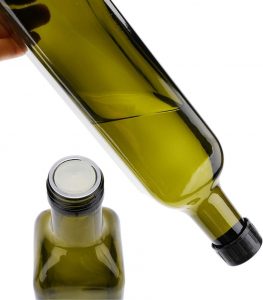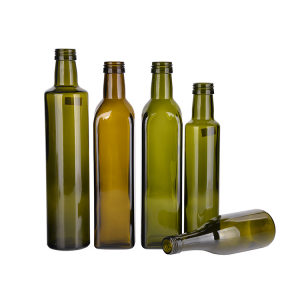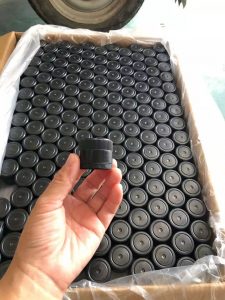Manufacturing Olive oil glass bottle
for over 20 years, communicated with our clients and know how to produce high quality olive oil dark bottle to store the oil.
When we are shopping in a super-market, we can find Olive oil is always sold in cans or dark glass bottles. Have you ever wondered why? The bottling way is not done to make the Olive oil more appealing to the consumers nor is it done to create a branding image. Using cans or amber glass bottle to package Olive oil is just for preservation purposes.
As a natural product, unlike red and white wine, olive oil does not improve the flavor or taste with time, so it is best used within a year. Nevertheless, depending on the variety, a freshly harvested olive oil could last up to 18 months without losing its sensory characteristics. Store olive oil in an air-tight glass bottle or container away from light and heat to maintain freshness.
Storing Olive Oil in Dark Glass Bottles vs. Metal vs. Plastic
Based on scientific statistics, it is found that a dark bottle is the best method of storage for olive oil and plastic containers can considered one of the worst. The latter is due to many reasons. The first being plastic is typically clear which allows UV rays to penetrate the oil. Olive oil plastic is also known to have traces of BPA, a chemical which can seep into the food which it is storing. BPA can cause brain and behavior conditions. However, plastic was created during World War Two and there have not been enough studies conducted to find concrete evidence yet.

Dark green glass allows the consumer to see the olive oil and examine the quality. And most importantly, it also blocks sunlight, small molecules, and glass is a stable material does not seep into the olive oil itself. Glass bottle can be recycled and make the environment sustainable. The popularity of packaging olive oil in cans and coated paperboard is becoming dominant in the industry as well.
While many companies may still prefer the option of glass since they can see the product, cans and coated paperboard are known to have the same benefits as the glass bottles. The cans and coated paperboard are not only cheaper but are easier to carry and can be recycled as well.
Storage Containers
Olive oil can be kept longer than most other edible oils. Although it can get rancid, olive oil is less likely to become rancid than other oils, especially if it is stored properly. The best containers for storage are glass (especially tinted glass), ceramic, porcelain, or non-reactive metals such as stainless steel.
Olive oil will oxidize rapidly if it is not kept in a sealed container. If olive oil is stored in a bottle, always replace the cap on the bottle and keep it tightly sealed. Never put olive oil in a container that does not have a tight cap or some other method of sealing the container.
Do not store olive oil in containers made of reactive metals such as copper or iron. The chemical reaction between the olive oil and the metal will damage the oil and may produce toxins. Olive oil should not be stored in plastic containers because the oil may absorb PVC’s from the plastic.
How to Store Olive Oil (Temperature, Light, etc.)
As a natural product, and unlike wine, extra virgin olive oils do not improve with time, so it is best used within a year. Nevertheless, depending on the variety, a freshly harvested olive oil could last up to 18 months without losing its sensory characteristics. Store food products in an air-tight bottle or container away from light, free radicals, light exposure, and heat to maintain freshness.
Some Olive oi makers believe their olive oil should be seen, so the glass bottles are as of now the preference package. The best way to store Olive oil is in opaque bottles, to keep it out of the sun, exposed to light, and in a dark place.
If left in sunlight, olive oil can go rancid and become unusable to the consumer. A modern trend among interior decorators is to display olive oil in the kitchen, such as on a countertop. By doing so, consumers may never enjoy the prestige taste of the Olive oil itself.
Location for Storage
To keep the Olive oil in supreme condition, place your bottle in the darkest part of your kitchen. After all, you want to be able to use it for months to come rather than have it turn rancid within weeks of purchase. Ideally, this dim place would be a cabinet with closing doors or a revolving door.
It is important to store olive oil in a cool, dark place. A wine cellar is an ideal place for storing olive oil because it is dark and the temperature is cool and constant. Since most of us do not own wine cellars, a kitchen cabinet located away from the stove and away from direct sunlight will work quite well.
Temperature for Storage
The ideal temperature for storing olive oil is 57°F, although a normal room temperature of 70ºF works very well if the olive oil is stored in a dark area where the temperature remains constant. Olive oil will solidify at 36ºF, but it will return to a liquid state as soon as the temperature rises. In colder weather, olive oil may turn cloudy, especially if the temperature of the storage area falls below 50ºF.
Do not store your prestigious Olive oil near the stove, oven, or near your dishwasher. Both emit heat which can cause great damage to this cold pressed olive oil.
If you decide to transfer your Olive oil to another bottle, such as one with a dispenser, there are a few codes of conduct to follow in order to keep that rich flavor. Typically, a consumer should only transfer 7-10 days of the original Olive oil to a bottle dispenser and keep the remaining oil in the original bottle. You want to transfer only as much as you think you will need.
It is important to be careful with measurements when adding any herbs to the olive oil. If these outside food variables are in the bottle for an extensive amount of time, they can alter the olive oil’s chemical make-up and cause the original, prestigious taste to diminish. It is best to wait for the olive oil to be served and then add whatever you want to it. Usual additions include, but are not limited to, garlic, parsley, and pepper.
As a host is preparing to serve their Olive oils, they may ask whether it is better to use a dispenser to pour olive oil or not. Unfortunately, this is not as simple as a yes or no answer. Olive oil dispensers are typically made of stainless steel, a useful choice when wanting to keep the strong flavor of Olive oils. They also help control how much olive oil transpires. If you do invest in a dispenser, try to find one that brands itself as airtight. This will help the olive oil from losing any flavor and it will keep small, undesired molecules out of the oil. The bottom line is olive oil will taste the same whether a dispenser is used or not.
Olive oil can be served in all kinds of manner. It can be used as to make salad dressing, as a dipping sauce, a base on a frying pan, etc. Keep in mind, none of this will be possible if the olive oil is not stored properly.
Refrigeration will extend the life of olive oil without harming the oil. The oil will become cloudy and solidify in the refrigerator, but this will not significantly affect the quality or flavor. When the oil is warmed to room temperature it will return to a liquid state and its color will be restored. Refrigeration does not harm most grades of olive oil, but it is not recommended for expensive extra virgin varieties because condensation may develop in the bottle, affecting the flavor.
Olive oil Storage Containers
Olive oil can be kept longer than most other edible oils. Although it can get rancid, olive oil is less likely to become rancid than other oils, especially if it is stored properly. The best containers for storage are glass (especially tinted glass), ceramic, porcelain, or non-reactive metals such as stainless steel.
Olive oil will oxidize rapidly if it is not kept in a sealed container. If olive oil is stored in a bottle, always replace the cap on the bottle and keep it tightly sealed. Never put olive oil in a container that does not have a tight cap or some other method of sealing the container.
Do not store olive oil in containers made of reactive metals such as copper or iron. The chemical reaction between the olive oil and the metal will damage the oil and may produce toxins. Olive oil should not be stored in plastic containers because the oil may absorb PVC’s from the plastic.
Safety Tips
Olive oil is safe to use even if it has oxidized. The flavor and aroma may not be very pleasant, but it is not harmful if consumed.
Some flavored olive oils have additives that may require refrigeration in order to preserve them. Others may not require refrigeration because of the process used when manufacturing the oil, so it is best to read the label carefully. It is usually not safe to make your own flavored olive oils at home and keep them for any length of time. Some flavoring agents may promote the growth of bacteria and can only be safely added with commercial processes. You may, however, prepare homemade flavored olive oils if they are used immediately and any leftover oil is disposed of.
A major safety concern is when olive oil (and any other cooking oil) is heated to a very high temperature for deep-frying. Follow the recommendations listed under deep-frying safety tips for more:
- Buy olive oil that is stored in a dark glass container, coated paperboard, or can
- Keep olive oil out of the sunlight and store it in a dark place.
- Do not place your olive oil near the stove, oven, or dishwasher.
- Transfer your olive oil to a smaller container when serving.
- Try not to leave herbs or garlic in the olive oil container for more than a day.
- Dispensers are a personal preference.
Conclusion
MC Glass Bottle is China-based Olive oil glass bottle manufacturer, owing 20 years factory and exporting experience. Serve clients all over the world.

Nowadays, green antique round or square Olive Oil glass bottle with tamper evident plastic cap is very popular since the cap do not need to be sealed by machine.

In order to make your branding outstanding, we can provide custom glass bottle with printing on the glass surface, that means decorated Olive Oil glass bottle, please visit. The shape is very special with disc round. The surface is full printed in matt black color and add your custom artworks.
We welcome your inquiry about Olive oil glass bottles. Please believe packaging your premium Olive oil in a dark glass bottle is the best way to store and sell the Olive oils.

